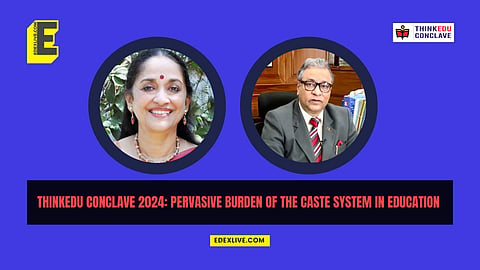

There is a persistent need to discuss the caste system within the education landscape, said Nanditha Krishna, author, at the 13th ThinkEdu Conclave 2024, presented by SASTRA University, in Chennai on Wednesday. Participating in a panel discussion titled “Freeing Education of Baggage: The Right Fundamentals,” chaired by Ravi Shankar, Consulting Editor, Sunday Standard, Krishna delved into the burdens that afflict the educational system.
“In the education system, we are unable to stop discussing the caste system, whether it be the BC quota, MBC, or any other,” said Krishna, urging for critical examination of our education system to understand the origins of schools and colleges.
“These institutions were initially established to serve the administrative needs of the East India Company. In the British Empire, governance-level personnel necessitated the establishment of colleges. However, the primary objective was not education. Consequently, we find ourselves in a system today where learning is the byproduct,” said Krishna.
Highlighting the intrinsic problems associated with the current education system, Krishna emphasised the need for fostering creativity and encouraging students to challenge conventional learning.
“Education's purpose should be to foster creativity and encourage students to question what they learn. Unfortunately, our current system falls short in promoting these ideals. There are two significant challenges we face: firstly, the kind of education we receive, which becomes a burden; secondly, the pervasive burden of the caste system. This poses a significant problem, as parents must disclose their child’s caste upon school entry, and students are required to declare their caste when entering college,” she said.
She advocated for a shift in educational priorities, urging students to research and engage with the works of figures such as Savarkar, Swamy Vivekanandha, and Subramanya Bharathi.
Jawhar Sircar, member of Parliament and former secretary, union ministry of culture, acknowledged the baggage within the education system.
“A college serves as a platform where relationships are initiated, social interactions take place, and ideas are exchanged. However, it’s essential to acknowledge the presence of certain burdens,” he said.
He argued that while there have been content changes and the inclusion of new discoveries, there is a prevailing sentiment that education remains excessively westernised.
“I firmly believe that significant changes were not implemented post-independence. While there have been adjustments in content and the inclusion of new discoveries, there’s a prevailing sentiment that our education system is excessively westernised,” said Sircar.
